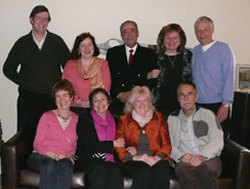
The Ottawa Balint group:
(clockwise from top left) Drs Stuart Macleod, Kitty
Carson, Hazem Hamdy, Christiane Kuntz, leader Barry
Dollin, John Shier, Robin Beardsley, Kathryn Gauthier
and Miriam Salamon
Photo courtesy of Dr Miriam
Salamon |
Every other Tuesday morning, nine
Ottawa-area family physicians file into a local psychiatrist's
office and sit in a circle.
The psychiatrist, Barry Dollin,
puts on a pot of coffee. Sometimes someone brings some
muffins. And then something unusual happens: the doctors
open up about all their professional concerns —
things like how to deal with a difficult patient, a
patient who committed suicide, boundary issues or complaints
about office staff.
"You think you can teach people
things just by giving them information in medical school,"
says Dr Dollin, "but a lot of what you need to learn
in medicine are the ethical elements — how we think
and feel."
That's been the organizing principle
of Dr Dollin's support group, called a Balint group,
since it began meeting in 1984.
Despite the burgeoning interest
in physician health, however, precious few Balint groups
have sprung up in Canada.
"LIKE
A SURGEON HIS KNIFE"
The story begins with Michael Balint, who was perhaps
the first GP-psychotherapist ever. Born in 1896 in Budapest,
Dr Balint began to experiment with Freud's "talking
cure." He did influential work in London, where he led
efforts to study "the psychological implications of
general medical practice" and, as he wrote idiosyncratically
in his 1957 book The Doctor, His Patient and the
Illness, the "study of the pharmacology of the drug
'doctor.'" His goal: to teach GPs to use their emotions
"like a surgeon his knife."
To do that, Dr Balint and his colleagues
created the model in use worldwide today: a group of
up to a dozen physicians sit in a circle and talk about
their emotional experiences treating patients.
EMOTIONAL
AID
A Balint group typically uses a case as a jumping-off
point for the participants' discussion. "It might be
a case where they felt sad, or angry, or had trouble
with what a patient was talking about," says Dr Katherine
Warren, who leads a group for psychiatry residents at
Dalhousie University. "Not how they managed the clinical
care, but how they managed themselves."
Dr Miriam Salamon, a member of
Dr Dollin's Ottawa group, once asked the group for advice
on how to deal with a leaky water cooler. Reminded of
the incident, Dr Dollin laughs and then says, "It represents
the fact you can't keep your professional identity in
a box. Even though you're a doctor, you have to pay
rent. You have problems with your water cooler and your
staff and you have to fix your toilets." In other words,
doctors are people too, and sometimes people need a
bit of support.
Qualitative research has shown
that Balint groups help not only with patient care but
also with physicians' ability to cope with difficult
work, and they may prevent burnout.
CANADIAN
OPPORTUNITY
Besides the Ottawa group and the Dalhousie group, very
few Canadian Balint groups exist. Nineteen countries
are members of the International Balint Federation,
including Serbia and Montenegro; Canada is conspicuously
absent. Why has uptake been so disappointing here?
"Because it is fundamentally messy
and it is threatening," says Dr Dollin. "We sometimes
talk about the line between professional development
and personal therapy. It is a painful line — people
might not want to have to face their own foibles and
weaknesses."
Dr Warren agrees. "I think it is
a vulnerability thing. In medicine, there's that old
idea that you are the expert who's very strong and people
struggle with the idea they are presenting difficulties.
I think people are often concerned their conduct or
skill will be criticized. But that is one of the benefits,
to help people with things they are struggling with,
to normalize it."
|